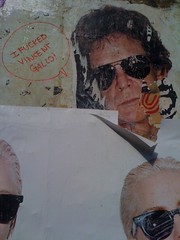the brief, undefaced life of the williamsburg bon iver billboard (pazz & jop notes 2011)
A few months ago, a new ad went up at the corner of Grand Street, down the Bedford Avenue central drag in Williamsburg. As with the wall of Lou Reeds that covered a construction site a while back, near the new Duane Reade, I really wanted to see it covered in graffiti. Eventually, somebody mustered up an “I fucked Vincent Gallo” speech bubble for poor ol’ Lou, who seemed more like a set decoration than anything else. What was it an ad for, though? There was no text. Was it Lou’s leather jacket? Maybe just the Lou brand?
It was late summer, I’m pretty sure, when Bon Iver came to Williamsburg. His painted visage sat there on a guitar amp next to his bandmates [correction: his managers, including his brother], looking like a brah among brahs, in a Jagjaguwar shirt, arms open, doofy vibes, and hawking whiskey. One of us! And, brah, Bushmills! After about a month, somebody pasted some street art parody QR codes ungracefully over Mr. Iver’s junk, as well as similar regions of the other fellows in his band. I meant to take a picture the next time I walked by, but they’d been quickly scraped off. Not made for brick, it seems.
That nobody otherwise abused Justin Vernon’s not-selling-out-buying-in likeness is absolutely a deep personal failure on my part. I really should have done it, if only on general principle. It means that Bon Iver has already won. And I’m just not sure how I feel about that. I’ve got no real beef with the guy personally. But mostly I still hate most corny-ass non-jazz saxophone and Bruce Hornsby and 1980s/1990s Grateful Dead, which is what Bon Iver and Justin Vernon represent to me, the triumph of the crappy part of hippiedom over righteous experimentation and thoughtful chaos. Despite the fact that Vernon’s music seems genetically bred for me–almost as if under some creepy lab conditions with nostalgia-plumping steroids–I’ve never connected with it remotely, never been able to recall a hook or a melody or even a lyric. I’ve tried. He seems like a sweet guy, from all my interactions with him, culturally mediated or otherwise. Still nothing.
But I come not to hate on Bon Iver. Really. I come to hate on The National. Man, they suck. I went through a similar pattern with them for an album or two, trying–because of a then-ladyfriend, because of some pals who dug them–to get into music that ultimately just felt bland and wimpy. What Coldplay are to Radiohead, The National seemed to Wilco. Again, dudes seemed alright. They even seem to like the Dead, too, though I’m utterly terrified about the prospect of them curating a Dead tribute disc, which they seem to be doing. The positive that I’ve taken out of all of this, alongside The Nationalol’s recent 6-night run at the Beacon Theater, and other signs: the hippies–or at least their Bon Iver-loving descendants–still make up an authentic silent majority in popular music fandom.
Phish’s Trey Anastasio announced that he was working with The Nationalolol, appeared with them onstage, and a small chunk of the internet blew up. Falling more on The Nationalololololololol side of the equation, I think Anastasio and the 7 sets of conjoined and unconjoined twins that comprise the New York quatturodectet deserve each other in their gentle wimpiness. I wish far better for Anastasio, who at least has a history making adventurous music, though he’s long rivaled Lou Reed in the perversity of his creative choices. I can only hope the silent majority still has some anarchy thumping around inside them somewhere, a latent hippie impulse in the American pop consciousness ready for the word to start raising the freak flags everywhere. Which is what happened over the last few years, of course, between ye olde Fleete Foxes, Animal Collective, and what have you: a head re-entrenchment after years of bloody rockist/poptimist debates.
What I resent is how much of it–the Bon Iver Bushmills ad, the Trey/National collaboration–seems to transform gaudy tie-dye into another shade of beige. The Deadheads and the hippies at large deserve a more vibrant fate than that, something less compliant with the lame rock culture that’s settled over VIP-happy rock clubs and national media, less easy to put on as mellow background listening. Odds are, too, that Bon Iver will score high in Pazz & Jop this year, which means he’s both a critical and popular success.
A lot of the new music I kept coming back to this year abutted on Bon Iver’s territory, even, music that didn’t seem to be competing for anything. Especially, I loved the unadorned folk of Gillian Welch and David Rawlings’ The Harrow & The Harvest, and Arborea, another husband-wife folk duo specializing in ancient and fully present haunt. Caitlin Rose, a new singer/songwriter from Nashville, released a wonderful debut of ineffably modern countrypolitan songwriting. Not all of it came too close to Iver, though. Akron/Family (more my kind of post-Dead outfit) put out a pretty good album, but I spent more time with the series of Megaupload/Mediafire-distributed bmbz releases that distorted and stretched their psych into noise with buried and already familiar melodies. Oneida put on a few more 10-hour shows and a series of recordings in their various guises, including the late-night brah-out album I’ve been waiting for, Absolute II. Another album I loved was The Ex’s Catch My Shoe, glorious anti-anthems by a 30-year old Dutch punk band with a new lead singer and a horn section. Not usually a formula for awesomeness, but hey.
I spent plenty of the year righteously wallowing in the throes of old music, too, trying to ignore the aggressively weird central argument of Simon Reynolds’ Retromania, which seemed to claim that there was something somehow wrong with this practice. Just as all music is world music, though, all music–or, at least, all recorded music–is old music. It is the most central tenet of fandom, wanting to lift the needle–virtual or real–back to the beginning of the track to listen again and again and again and again. And the hope of being an active fan is to find more music that makes you want to do the same, that contains some fundamental humanity-carrying spark, piping fresh or recorded decades ago, to make you listen again.
It might appear anywhere, in the space between an acoustic guitar and a room tone, in an intentional lyric or unintentional phrasing, even in a big stupid/brilliant pop song. The latter didn’t happen to me this year but, as a hippie, that’s what I want: life flickering, a personality expressed. Also as a hippie, I recognize that there are plenty who seem to get that out of Bon Iver or American Idol or black metal or other sources of music that I’m equally mystified by. I can get down with a certain amount of objectivity, listening to appreciate what makes a finely constructed track/album/band, doling out the best in drone/pop/folk, but at the end of the year, I really just want music that I’m going to personally keep listening to even after the calendar changes. Pop accolades really don’t bother me, though. At least until Bon Iver starts turning up in ads for booze that I have to look at every day on my way to and from wherever.
So they gave Justin Vernon some heavy cash and he took it. Whatever. I even like Bushmills. What brought it home most for me, though, was when Vernon tweeted about [correction: told a NYT reporter] how he didn’t care about getting nominated for a Grammy, and then some band called him out for the Bushmills ad on Twitter, and then Pitchfork reported on it. They published a brief account of the spat. Just below it was an embedded video, made by Bushmills, featuring (I assume) exclusive footage of the Bushmills/Bon Iver photo shoot. That week, too, Pitchfork was bordered by massive banner ads from the same advertising campaign. I suppose it’s long been the reality, and not even that really bothers me.
What bothers me is the mundanity of it all. As with the beiged tie-dye, it’s just another bit that’s gotten sucked into the great blanding maw of the cultural conversation that has maybe neutered music entirely in the wake of new and weirder ways of meaning, like international debt crises, existential occupations, and phone hacking. WTF could Tom Morello or even Jeff Mangum ever do in such company, anyway? Maybe its best for music to just exit that conversation stage left, right, or even directly through the gift shop. I have no real idea how, or even what that means in concrete terms. Imagine a world without Pitchfork ratings. It’s easy if you try.
One day, I came home, and some guys were painting over the Bon Iver ad. They’d white-washed Vernon & co. (ha!) and were etching some new shapes over them. Specifically, the vague outlines of a Jedi and a Sith Lord, selling some new Star Wars video game. Good and evil mapped themselves over Vernon’s face, and he continued to peer unblinking into the now-fogging afternoon light, and the next day he was gone.




0 Comments